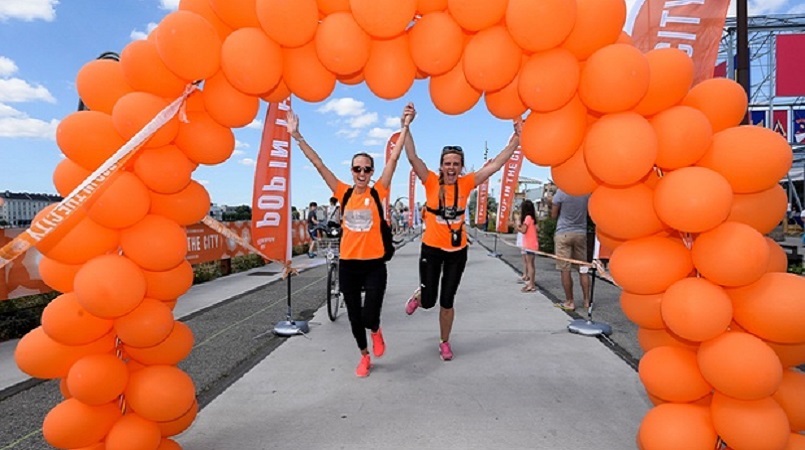
They say you shouldn’t eat before running, and I can confirm that counts double for insects.
As I set off in a jog after munching my way through six dry-roasted worms, beetles and crickets, an earthy, unusual taste coats the back of my throat. I take frequent sips – or, rather, increasingly frantic gulps – from a bottle to try and prevent their spindly bodies from repeating. And this isn’t even the strangest part of today.
It’s not that I didn’t know Pop in the City was going to be unusual. Online videos from previous incarnations of the urban adventure race show participants crawling along wires between tall buildings, hanging upside down from a trapeze and painting on art gallery walls with their breasts. It’s not exactly parkrun.
What it is, is a new and innovative take on the adventure-race format. Pairs of women wearing distinctive neon-orange T-shirts must orienteer themselves around a strange city, following clues to locations where 25 various challenges have been set up. These are split into five categories: extreme, sport, culture, art and charity, and all take participants behind the scenes of the city in some way.
“We wanted to leapfrog the cliches and take people out of their comfort zones,” says Maeva Guichaoua, one of the organisers who I had caught up with for a chat before the start at an old dockyard on l’île de Nantes, the island in the city’s river. She explains that the races were designed as a kind of extreme sightseeing, mixing comfort-zone stretching challenges with an up-close look at a new city.
The format was dreamed up in 2012 by a trio of young French women who got the idea from their own travels. “They realised the best experiences you have travelling are those you can’t anticipate,” says Guichaoua. Pop in the City’s motto, Discovery is a Game, reflects its aim to manufacture the kind of serendipity that elevates a weekend break to full-on gloating status.
It’s working. Even before the insects, this morning there have been a half dozen oh-no-we-didn’t-just-do-that moments. So far, my team has been invited to sing Get Lucky in Breton during a karaoke session in a turret of Nantes’ castle; helped some retired French men to sand down an old boat, as part of a local restoration program; learned charleston dancing, calligraphy and capoeira. And our rude awakening first thing: performing a reverse bungee jump, which pinged my companion 50ft in the air on two giant elastic bands. Judging by the dirty looks I’m getting five hours in, I’m still in the doghouse for that one.
Still swallowing hard, we run on to our next encounter at a local charity that helps to support blind people. Several of the people the charity works with are on hand to help with what turns out to be the most interesting challenge of the day. Blindfolded, we’re guided from the upper floor of the building and down a long flight of concrete steps, aided only by a white stick and their voices. It’s the living embodiment of the blind leading the blind, and – especially given that we’re not completely convinced our guides have the English for right and left down – appropriately eye-opening.
It’s also a great example of what’s different about Pop in the City. Adventure racing – along with other multi-discipline events such as Tough Mudder obstacle courses and triathlons – has been increasingly popular over the last decade, but most races emphasise the physical rather than the experiential. Having done an urban adventure race before, I had the idea that they were all checkpoints and machismo.
This is far less about fitness (those who are struggling can rent city bikes or hop on a tram; even hitchhiking is within the rules) than experiencing something new. Teams must complete as many tasks as they can in the eight-hour race, but a focus on adventure and the all-female entrants means it feels collaborative as well as competitive. Although there are queues for several of the tasks, rather than elbowing or jostling, teams take the opportunity to chat, compare notes on how they’re getting on and recommend challenges to each other.
It’s an addictive atmosphere, and many of the teams are repeat “poppers”. This year has seen three pops – the final event of 2015 (Brussels) on 26th September is already sold out – but plans are well in train for next year’s outings, when they plan to up the number from three to four, though they’re not telling on the locations yet. By 2017, the company plan to expand to the US and Asia.
All teams must make it back to the dockyard before 5pm to avoid being disqualified, so at around 4pm we complete our last challenge (running up a serious hill) and turn back towards the end. We join the stream of orange-T-shirted women jogging along by Nantes’ river in the afternoon sun.
As we run, we compare notes with other teams. One pair of thirty-something locals tell us they’ve got to see a whole new side to their own city. Others fill us in on tasks that we haven’t had time to do. Everyone has their own favourites: kayaking through weeping willows along the river; singing sea shanties with a choir of the homeless. Learning new skills. Pushing boundaries. Meeting unusual people.
Strangely enough, no one mentions the insects.
